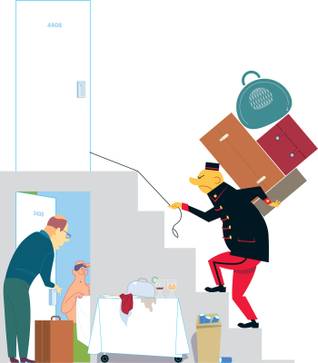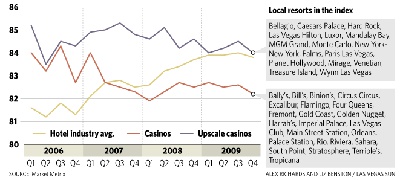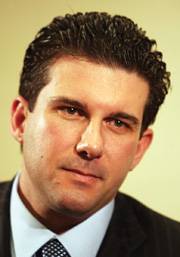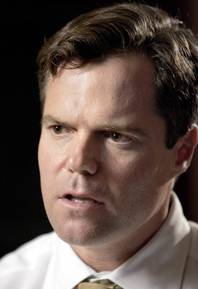
Chris Morris/Special to the Sun
Sunday, May 30, 2010 | 2 a.m.

Customer service in flux
Market Metrix, which develops research and marketing programs that help improve service at hotels and casinos, surveys a regular panel of frequent travelers online and posts the results on its website. The customer service indexes, based on 35,000 traveler surveys every quarter, represent customer satisfaction scores on scales of 1 to 100. A score of 80, for example, indicates that guests' expectations were met, or slightly more than met. Over the past four years, scores for casinos, which mostly include Las Vegas properties, have declined slightly while scores for noncasino hotels have gone up. Scores for upscale casinos also have fallen a little.

Anthony Marnell III
Sun Coverage
Ask frequent traveler Tom Slater which U.S. hotel provides him with the best customer service and he praises an Embassy Suites in Ohio over the many Las Vegas resorts he has stayed in.
This, from a guy who comes to the hotel capital of the world at least 10 times a year and is assigned casino hosts who are paid specifically to make his stay in Southern Nevada more pleasant.
At the Ohio hotel, which boasts little more than standard amenities, rank-and-file employees greet him by name and smile as they open doors for him and engage in friendly conversation.
“What these people do, expecting no tips in return, is amazing,” the 41-year-old office supply executive from Cleveland says. “I’m not a rock star. But in Dublin, Ohio, I’m treated like one. They are trained to treat you well, even if you’re a nobody.”
Lately, Las Vegas seems less hospitable to Slater. Too many of its hotel and casino employees are simply going through the motions, he says.
That’s the kind of complaint that has become more common as recession-battered resorts have cut staffing. It’s also the kind of gripe that can be immediately posted on the Internet for the world to see. Some casino managers and service experts say recession-forced cutbacks are fueling a host of complaints posted in online chat rooms, social networking sites and news forums.
“It’s no secret that customer service has slipped in Las Vegas,” says Anthony Marnell III, owner of the M Resort.
The complaints range from the disconcerting — abrupt and unapologetic employees, disappointing food, long waits for hotel service, slow cocktail service — to the egregious — lukewarm water, previous guests’ clothes left in the rooms, stained sheets, soiled toilets, overflowing garbage cans, trash-lined hallways, bedbugs.
In its survey of visitors last year, the Las Vegas Convention and Visitors Authority found that although most visitors were satisfied with their trips, 33 percent of dissatisfied visitors cited complaints about hotels, by far the biggest problem area and an increase from 26 percent in 2008.
Data from Market Metrix, which tracks customer satisfaction at many hotels and Las Vegas casinos on a more regular basis, show slightly declining scores for casinos over the past year relative to noncasino hotels, which have rising scores.
“There’s definitely a trend downward,” said Jonathan Barsky, vice president of research for Market Metrix. “It’s not big, but it’s definitely there.”
Many Las Vegas hotels simply don’t work hard enough at customer service, UNLV hotel management professor Jeff Voyles says.
“Vegas has gotten lost in that ‘build it and people will come’ mentality,” Voyles says. “We’ve never had to have world-class customer service or much of a service culture because people come here for a lot of reasons — like excitement — that may have little to do with customer service.”
Faced with a glut of rooms, Las Vegas properties must improve customer service to better compete for every possible guest, Voyles said.
Emphasis on training
Some hotels are turning to the Culinary Training Academy, a partnership between the Culinary Union and its membership hotels, to try to get the job done.
“There’s more of a premium being placed on customer service,” says Monica Ford, vice president of training and development at the academy. It has long taught the mechanics of hospitality jobs to legions of workers, including how to make beds, cook omelets and serve drinks. But lately, at the behest of local hotels, the academy has been putting a greater emphasis on basic customer service skills, such as addressing guests and being cordial. Spanish-speaking housekeepers, for example, are trained to greet customers in English.
Delivering top-notch service is that much tougher in Las Vegas, where giant casino hotels do more business and employ more people per property than their peers in virtually all other tourism destinations.
Southern Nevada has been hit harder by the recession than most cities, and on top of the drop in business, the customers who return are more frugal yet expect the same service levels they had grown accustomed to during the boom years.
After not filling vacant positions, laying off some workers and reducing hours for others, hotels are faced with the tough task of motivating their remaining staff, including people preoccupied with financial worries at home. Some workers also have been asked to take on more work after their companies downsized.
Doing more with less
Employees who are stretched thinner may not be doing anything more than is necessary if they feel their companies are not invested in their well-being, says Rick Garlick, senior director of strategic consulting for Maritz Research, a company that works with Las Vegas casinos and nongaming hotels.
Garlick waited 20 minutes this month to check into a three-star hotel on the Strip because the property had only two front-desk agents on duty.
It’s not just long waits at some front desks that have a lot of frequent visitors complaining. They also frequently note sparse cocktail service on the Strip, where casinos have cut costs by having fewer servers working the same, if not larger, areas of the casino floors.
Some hotels and casinos, including ones owned by Harrah’s Entertainment, have hired back employees after realizing they cut too deeply.
“The customer is always going to expect great service” even if the recession has made that a more difficult target, says Jan Jones, senior vice president of communications and government relations at Harrah’s. “Just because we are trying to manage costs doesn’t mean they want it done at their expense.”

Jan Jones
With no historical precedent on the Strip for the Great Recession, there was no blueprint for what staffing levels would be appropriate in a prolonged downturn, Jones notes. Falling customer service scores — data collected by random surveys of customers — revealed problem areas to managers who have responded by restoring some positions that had been cut, she says. Strip properties, she says, have become more adept at determining which cuts are appropriate given depressed business levels.
The Culinary Training Academy is seeing a small rebound in hiring this year, too. Although the number of students that academy officials expect to train this year — 2,000 — is still less than the 2,200 it trained in 2007, the number of students placed into hotel jobs has gone up each month so far this year.
Attitude matters
Voyles says some of Las Vegas’ customer service problems are the result of employees who dislike their hotel industry jobs or go to work upset and ill-equipped to hide their emotions. Some of these feelings are recession-related.
But he also says Las Vegas’ customer service shortcomings must be solved from the top down.
Hotels and casinos need to start with hiring the right people. Many hire front-line workers based on learned skills rather than the strength and appeal of their personalities, Voyles says.
Marnell says he hired workers mainly for their friendly personalities and eagerness to please. Positive feedback about service at the M Resort has so far helped save his property from financial ruin in the recession, he says.
Voyles says a happy workplace is another key to great customer service.
“To have good customer service you have to have an organizational culture that ... cares about its employees and wants them to be happy. If your employees are happy they’re going to support you.”
Bill Paulos, a former Strip executive who co-owns Cannery Casino Resorts, is among those using that approach.
“My main function now is to preach and be a cheerleader for employees. To go down and say, ‘You’re doing a great job,’ ” Paulos says. “That’s what’s lacking in this business ... How many managers thank their employees after a shift?”
Instead of bucking up employees who need encouragement, he says, some managers hurt morale by using fear and intimidation as a reaction to stress.
Workers “need to be told their jobs are fine and, ‘Here’s what you need to do to provide better service and earn more tips.’ They need to be told that every single day,” Paulos says.
Don’t forget to smile
At large hotels, basic skills such as smiling and making eye contact can fall by the wayside unless employers make a point of reminding workers to perform necessary gestures, managers say.
As part of a $165 million renovation and rebranding effort at the Tropicana, which recently emerged from bankruptcy, it is retraining its staff on customer service. Employees get one-page alerts about goings-on at the hotel and reminders such as to smile and approach customers who look lost, open the door for customers and stand out of their way if they are passing in a hallway.
Managers randomly “test” employees on these points by dropping in on their areas, watching them work and quizzing them on what they have learned.
“We’re in front of our employees every single day, drilling this into their heads,” says Bernie Vasquez, Tropicana’s new director of service culture.
Teaching five-star standards to a staff accustomed to two-star service has been a challenge, says Vasquez, a former training manager at MGM Grand and among four managers hired by the Tropicana last year to improve service at the budget property at a time when many other hotels have gutted training programs.
John Ely, senior vice president of marketing for hotel training company Signature Worldwide, thinks Tropicana’s work is paying off. Ely made a point to walk through several Las Vegas casinos during a recent trip. His tour included the Tropicana, which became a Signature client last year.
What most impressed him wasn’t the expensive artwork or deluxe surroundings of other resorts, but the Tropicana housekeeper who turned off a vacuum cleaner and walked over to Ely to ask him if he needed directions.
“That was a breakthrough moment,” he says.
Some executives say customer service is not declining at their hotels and casinos in Las Vegas. MGM Mirage CEO Jim Murren is one. He says hotel ratings and customer satisfaction scores are flat or slightly higher than a year ago at MGM Mirage properties.

Jim Murren
At the Bellagio, Michael Downs, vice president of hotel operations, says his managers are meeting more often to discuss how to improve customer service. The property dispatches managers to “go undercover” to check on employees throughout the resort. Managers meet weekly to discuss any breakdowns in service.
“I think we’re more focused on customer service and trying to be more creative to impress our guests,” Downs says. “Guests have a level of anticipation when they walk in here, so we’re focusing on what we can do to wow them.”
Acting on grievances
Unlike many hotels, front-line Bellagio employees are allowed to comp guests with a free room or other perks to quickly quell complaints. The resort also has built an executive lounge for customers staying in its high-end suites and has hired concierge employees who contact these customers before arrival to arrange restaurant reservations, show tickets or other activities.
As is the case at many other Las Vegas resorts, part of Bellagio’s marketing staff is devoted to investigating complaints and other comments cropping up on travel and social media websites, in addition to the comment cards and letters hotels traditionally receive. These sites, companies say, present a golden opportunity to turn neutral or disgruntled customers into loyal patrons by addressing legitimate concerns and extending freebies.
Ignoring comments can have the opposite effect, however.
At the M Resort, Marnell says management is on high alert for customer grievances.
“We look for repeat complaints and we go in and talk to the employees and figure out what the problem is and fix it,” Marnell says. “We don’t fight with customers, we listen to them. Ninety percent of them have valid complaints and issues. It’s hard to be perfect when you service 5,000 to 10,000 people a day.”
“There isn’t anyone in Las Vegas that isn’t focused on providing excellent customer service,” Jones says. “We realize that the future of Las Vegas, or much of it, is going to be based on the fact that we are the hospitality center of the world.”
Slater says it seems relatively simple to him. Las Vegas needs to make sure it has a lot more employees like the longtime bartender who greeted him with a smile and a hug — no tip required.
“The guy was just glad that people were out there, spending money.”
Sun reporter Patrick J. Coolican contributed to this report.

Join the Discussion:
Check this out for a full explanation of our conversion to the LiveFyre commenting system and instructions on how to sign up for an account.
Full comments policy